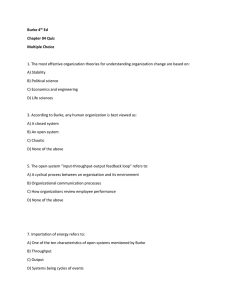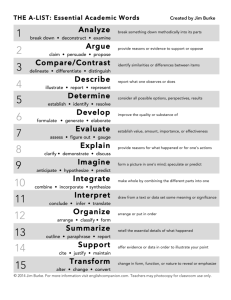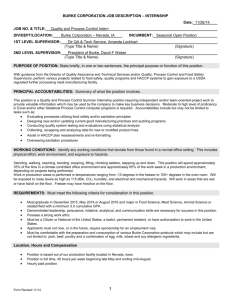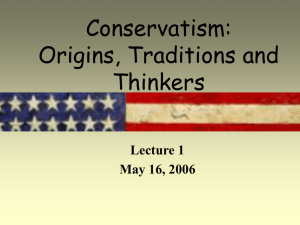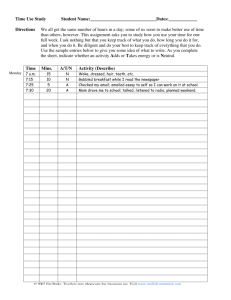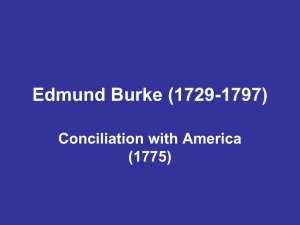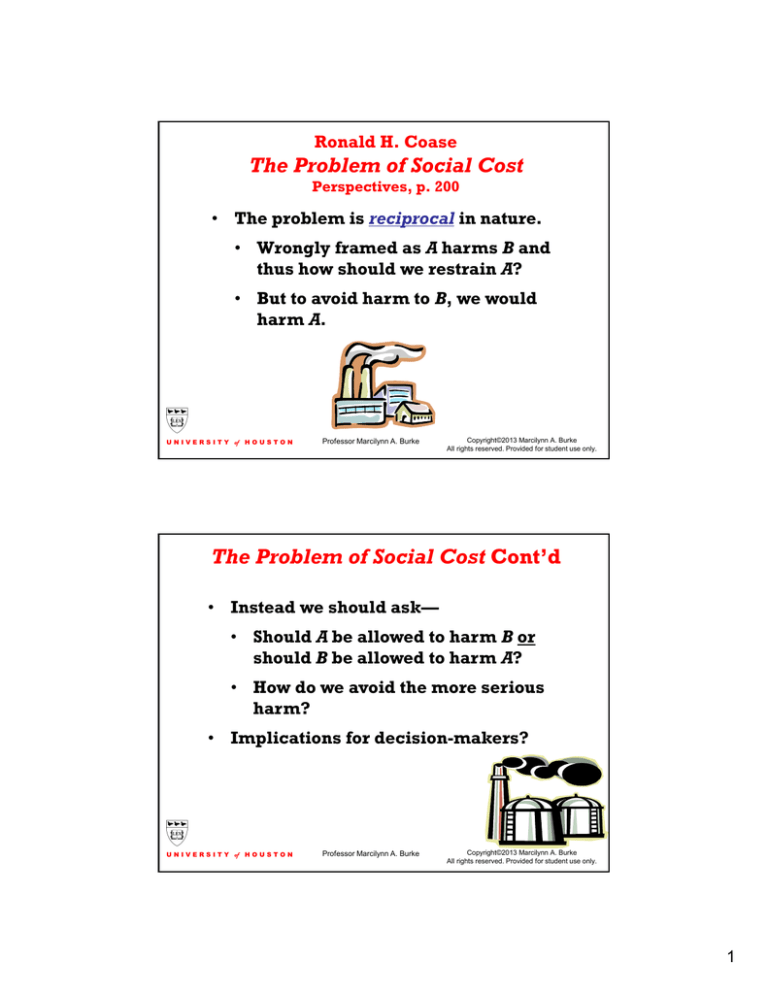
Ronald H. Coase
The Problem of Social Cost
Perspectives, p. 200
• The problem is reciprocal in nature.
• Wrongly framed as A harms B and
thus how should we restrain A?
• But to avoid harm to B, we would
harm A.
U N I V E R S I T Y of H O U S T O N
Professor Marcilynn A. Burke
Copyright©2013 Marcilynn A. Burke
All rights reserved. Provided for student use only.
The Problem of Social Cost Cont’d
• Instead we should ask—
• Should A be allowed to harm B or
should B be allowed to harm A?
• How do we avoid the more serious
harm?
• Implications for decision-makers?
U N I V E R S I T Y of H O U S T O N
Professor Marcilynn A. Burke
Copyright©2013 Marcilynn A. Burke
All rights reserved. Provided for student use only.
1
Coase Hypothetical
Annual Cost of Fencing = $9
Price of Crop per Ton = $1
Number in
Herd
(Steers)
1
2
Annual Crop Crop Loss Per
Loss
Additional
(Tons)
Steer (Tons)
1
1
3
2
3
6
3
4
10
4
U N I V E R S I T Y of H O U S T O N
Professor Marcilynn A. Burke
Copyright©2013 Marcilynn A. Burke
All rights reserved. Provided for student use only.
Finding the
parties
Inspecting
or policing
Informing
the parties
Transaction
Costs
Drafting the
agreement
U N I V E R S I T Y of H O U S T O N
Professor Marcilynn A. Burke
Conducting
negotiations
Copyright©2013 Marcilynn A. Burke
All rights reserved. Provided for student use only.
2
The Coase Theorem
Outcome without
transaction
costs.
Outcome with
transaction
costs.
Ultimate result is
the same, no
matter what the
initial
assignment of
rights.
Rearrangement
of rights will
occur only if
increase in value
of production is
greater than
transaction costs.
U N I V E R S I T Y of H O U S T O N
Professor Marcilynn A. Burke
Copyright©2013 Marcilynn A. Burke
All rights reserved. Provided for student use only.
Strong and Weak Versions of the
Coase Theorem
• The Invariance Proposition (strong)
• In a world of zero transaction costs,
a change in legal rules will have no
effect on the allocation of
resources.
• The Efficiency Proposition (weak)
• Regardless of initial entitlements
in a world of zero transaction costs,
individuals will bargain to garner
all possible gains from trade.
U N I V E R S I T Y of H O U S T O N
Professor Marcilynn A. Burke
Copyright©2013 Marcilynn A. Burke
All rights reserved. Provided for student use only.
3
Assumption that there are no transaction
costs is a very unrealistic one.
U N I V E R S I T Y of H O U S T O N
Professor Marcilynn A. Burke
Copyright©2013 Marcilynn A. Burke
All rights reserved. Provided for student use only.
Another Hypo
•
Ms. Jones owns and operates a hog farm.
•
Her revenues are $1000 per month.
•
The damage to the neighbors (odor) is
valued at $1500 per month.
•
There are no transaction costs.
U N I V E R S I T Y of H O U S T O N
Professor Marcilynn A. Burke
Copyright©2013 Marcilynn A. Burke
All rights reserved. Provided for student use only.
4
Scenario No. 1
Ms. Jones has the RIGHT to operate
the hog farm.
•
How much would the neighbors be
willing to pay Ms. Jones not to operate
the hog farm?
•
How much would Ms. Jones demand
to forego operating the hog farm?
•
What would the end result be?
U N I V E R S I T Y of H O U S T O N
Professor Marcilynn A. Burke
Copyright©2013 Marcilynn A. Burke
All rights reserved. Provided for student use only.
Scenario No. 2
Ms. Jones DOES NOT have the RIGHT
to operate the hog farm.
•
How much would it cost Ms. Jones to
operate the hog farm if she had to pay the
neighbors off for their damages?
•
How much would Ms. Jones’ net revenue
be after paying off the neighbors?
•
What would the end result be?
U N I V E R S I T Y of H O U S T O N
Professor Marcilynn A. Burke
Copyright©2013 Marcilynn A. Burke
All rights reserved. Provided for student use only.
5
Moral of the Story
No matter what the rule is, Ms. Jones will not
operate the hog farm (because damages
($1500) are greater than revenue ($1000).
U N I V E R S I T Y of H O U S T O N
Professor Marcilynn A. Burke
Copyright©2013 Marcilynn A. Burke
All rights reserved. Provided for student use only.
Wealth Effects of Not Operating the
Hog Farm (Weak Proposition)
• Already had the hogs.
• Land particularly suited for hog
farming - pig sties already in place.
• The only thing Ms. Jones knows how
to do is hog farm.
• Local feed store.
U N I V E R S I T Y of H O U S T O N
Professor Marcilynn A. Burke
Copyright©2013 Marcilynn A. Burke
All rights reserved. Provided for student use only.
6
Another Example on Coase
• Factory emits soot.
• Five neighbors hang clothes outside to
dry because they don’t have dryers.
• Soot damages neighbors’ clothes.
• Damages are $75 for each neighbor
($75 x 5 = $375 total).
U N I V E R S I T Y of H O U S T O N
Professor Marcilynn A. Burke
Copyright©2013 Marcilynn A. Burke
All rights reserved. Provided for student use only.
Potential Solutions
• Screen that catches the soot = $150.
• Everyone gets an electric dryer = $50
each ($50 x 5 = $250 total).
• Everyone gets new clothes = $75 each
($75 x 5= $375 total).
Strong Version: Either way, the screen
will be chosen for $150.
U N I V E R S I T Y of H O U S T O N
Professor Marcilynn A. Burke
Copyright©2013 Marcilynn A. Burke
All rights reserved. Provided for student use only.
7
Transaction Costs Taken Into Account
• Factory emits soot.
• Five neighbors hang clothes outside to
dry because they don’t have dryers.
• Soot damages neighbors’ clothes are $75
each ($75 x 5 = $375 total).
• Transaction costs are $60 for each
neighbor ($60 x 5 = $300 total ).
• Transaction costs are $100 for the factory.
U N I V E R S I T Y of H O U S T O N
Professor Marcilynn A. Burke
Copyright©2013 Marcilynn A. Burke
All rights reserved. Provided for student use only.
Transaction Costs Taken Into Account
For the residents:
• Screen that catches the soot = $150/5
= $30 + $60 in transaction costs = $90
each, $450 total ($90 x 5).
• Everyone gets an electric dryer = $50
each, $250 total ($50 x 5).
• Everyone gets new clothes = $75
each, $375 total ($75 x 5).
What result?
U N I V E R S I T Y of H O U S T O N
Professor Marcilynn A. Burke
Copyright©2013 Marcilynn A. Burke
All rights reserved. Provided for student use only.
8
Transaction Costs Taken Into Account
If the factory is assigned the entitlement
initially (the right to pollute), and therefore
the residents must pay for the solution—
the residents would buy dryers for $250 total
($50 x5).
U N I V E R S I T Y of H O U S T O N
Professor Marcilynn A. Burke
Copyright©2013 Marcilynn A. Burke
All rights reserved. Provided for student use only.
Transaction Costs Taken Into Account
For the factory:
• Screen that catches the soot = $150.
• Everyone gets an electric dryer = $50
each, $250 ($50 x 5) + $100 in
transaction costs = $350.
• Everyone gets new clothes = $75
each, $375 ($75 x 5) + $100 in
transaction costs = $475.
What result?
U N I V E R S I T Y of H O U S T O N
Professor Marcilynn A. Burke
Copyright©2013 Marcilynn A. Burke
All rights reserved. Provided for student use only.
9
Transaction Costs Taken Into Account
If the residents are assigned the
entitlement initially (right to be free from
pollution), and therefore the factory must
pay for the solution—
the factory would buy the screen for $150.
U N I V E R S I T Y of H O U S T O N
Professor Marcilynn A. Burke
Copyright©2013 Marcilynn A. Burke
All rights reserved. Provided for student use only.
Robert C. Ellickson
Order Without Law:
How Neighbors Settle Disputes
Perspectives, p. 210
Ellickson’s Restatement of
the Coase Theorem
• Formal law?
• “in the shadow”
U N I V E R S I T Y of H O U S T O N
Professor Marcilynn A. Burke
Copyright©2013 Marcilynn A. Burke
All rights reserved. Provided for student use only.
10
Ellickson, Order Without Law Cont’d
The Invariance or Strong Proposition
• Complete enforcement
• No violation ignored
U N I V E R S I T Y of H O U S T O N
Professor Marcilynn A. Burke
Copyright©2013 Marcilynn A. Burke
All rights reserved. Provided for student use only.
Ellickson, Order Without Law Cont’d
The Efficiency or Weak Proposition
• People will structure their affairs to
their mutual advantage.
• “beyond” the shadow
• Informal norm of cooperation
U N I V E R S I T Y of H O U S T O N
Professor Marcilynn A. Burke
Copyright©2013 Marcilynn A. Burke
All rights reserved. Provided for student use only.
11
Ellickson, Order Without Law Cont’d
Norm of Cooperation
• Rancher is responsible for his animals.
• Should put up with minor damages
from occasional trespass.
• Does not matter whether range is open
or closed.
U N I V E R S I T Y of H O U S T O N
Professor Marcilynn A. Burke
Copyright©2013 Marcilynn A. Burke
All rights reserved. Provided for student use only.
Ellickson, Order Without Law Cont’d
Incomplete Enforcement:
The Live-and-Let- Live Philosophy
• Wild animals
• Symmetrical risks
• Reciprocal restraint
U N I V E R S I T Y of H O U S T O N
Professor Marcilynn A. Burke
Copyright©2013 Marcilynn A. Burke
All rights reserved. Provided for student use only.
12
Ellickson, Order Without Law Cont’d
Mental Accounting
• Average reciprocity of advantage
• Multiplex relationships (iterated
play)
• Accounts in- and out-of-balance
• Creditor v. debtor
U N I V E R S I T Y of H O U S T O N
Professor Marcilynn A. Burke
Copyright©2013 Marcilynn A. Burke
All rights reserved. Provided for student use only.
Ellickson, Order Without Law Cont’d
Controlling Deviants
• Informal control: self-help
• Formal control: public official
• Claims for monetary relief
• Formal claims
U N I V E R S I T Y of H O U S T O N
Professor Marcilynn A. Burke
Copyright©2013 Marcilynn A. Burke
All rights reserved. Provided for student use only.
13
Ellickson, Order Without Law Cont’d
A Few Points to Consider
• Homogeneity
• Population density
• Rural v. urban
U N I V E R S I T Y of H O U S T O N
Professor Marcilynn A. Burke
Copyright©2013 Marcilynn A. Burke
All rights reserved. Provided for student use only.
14

